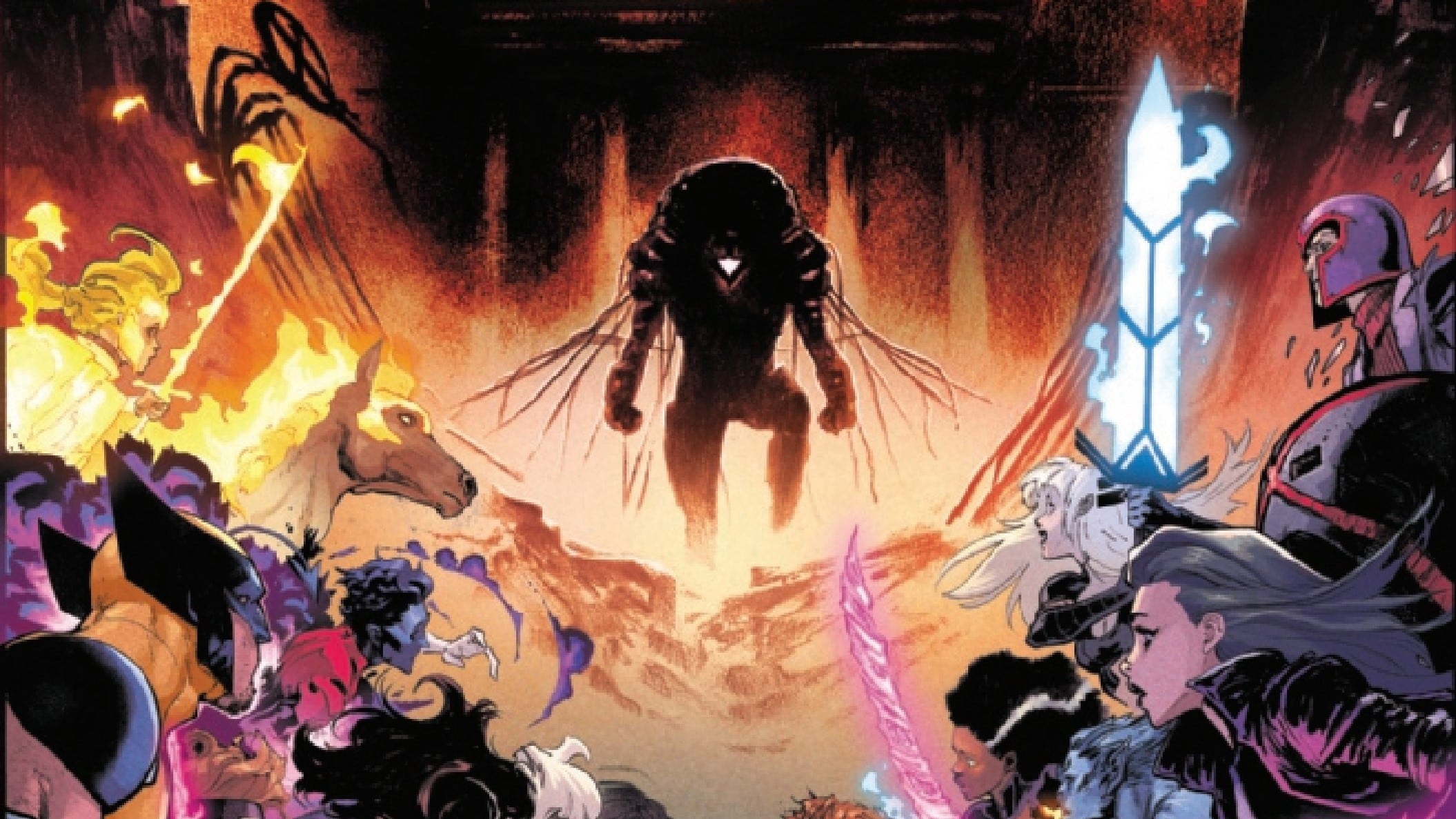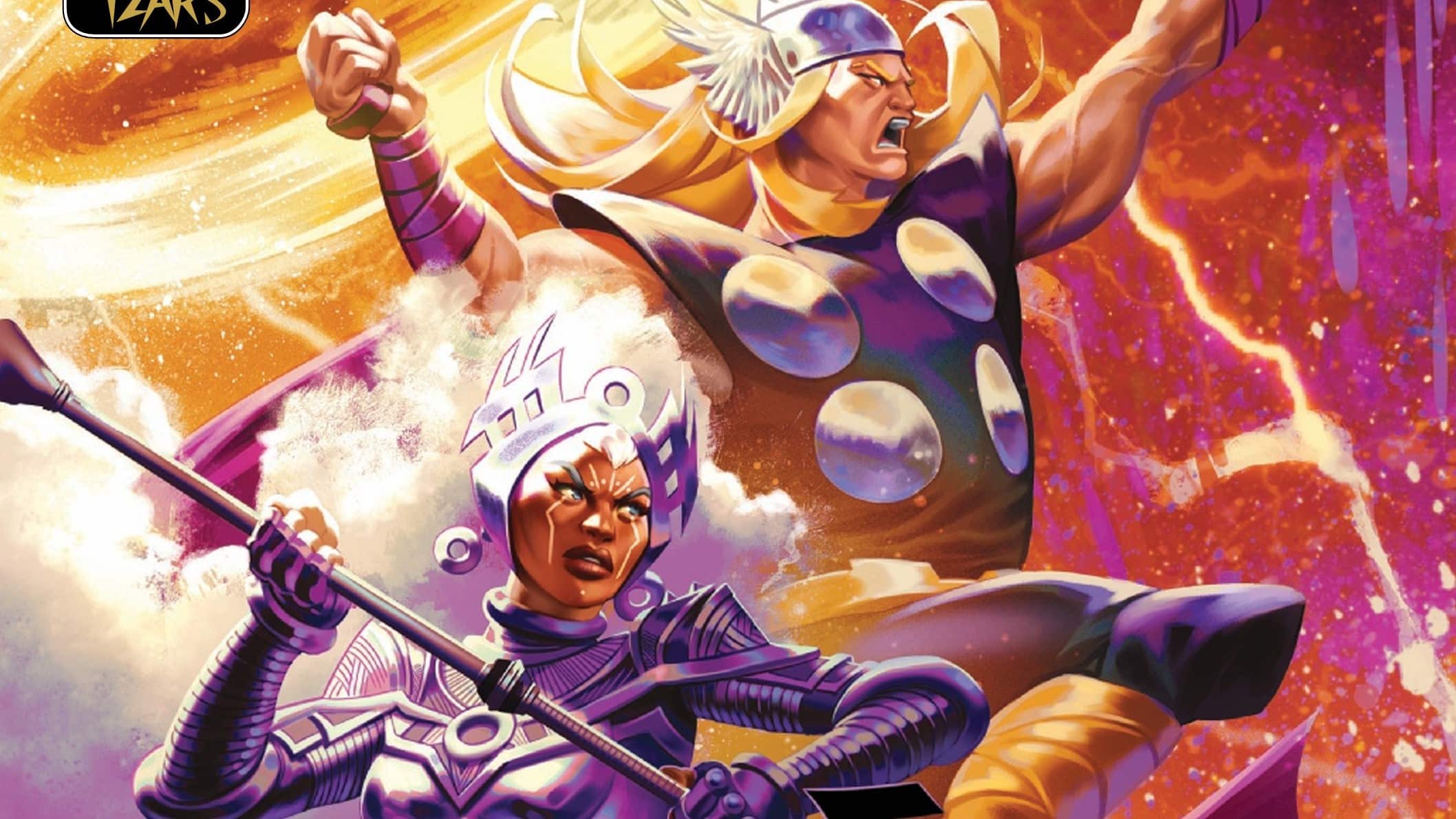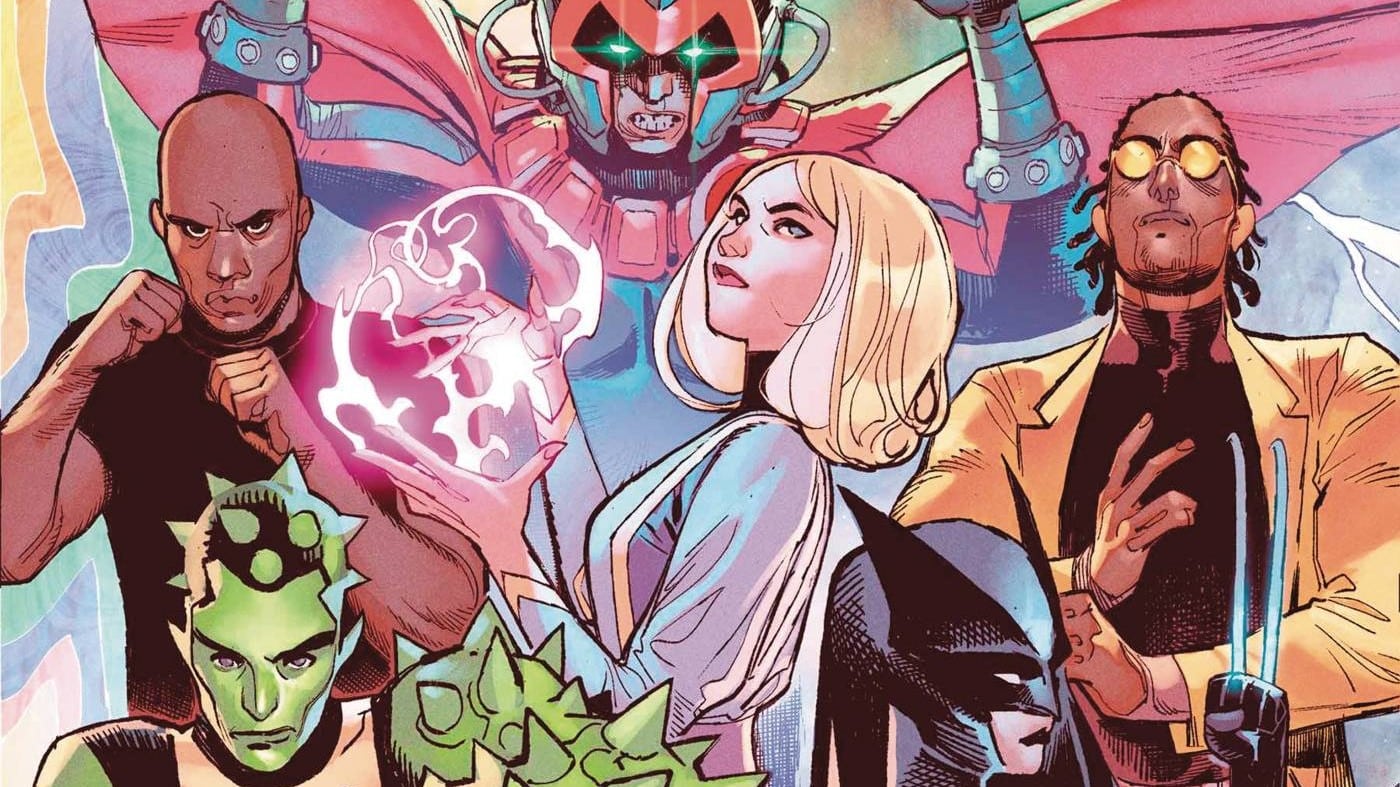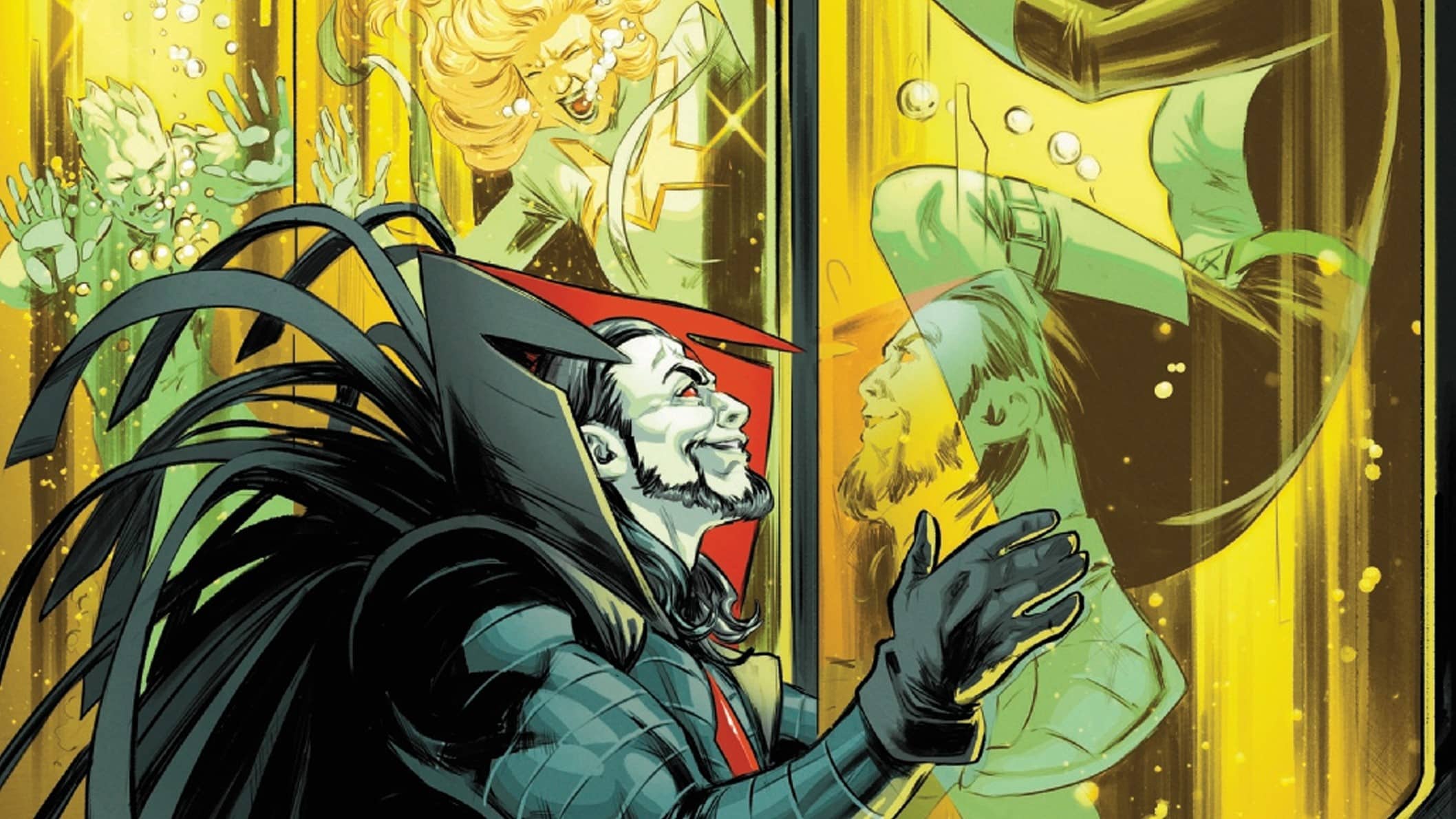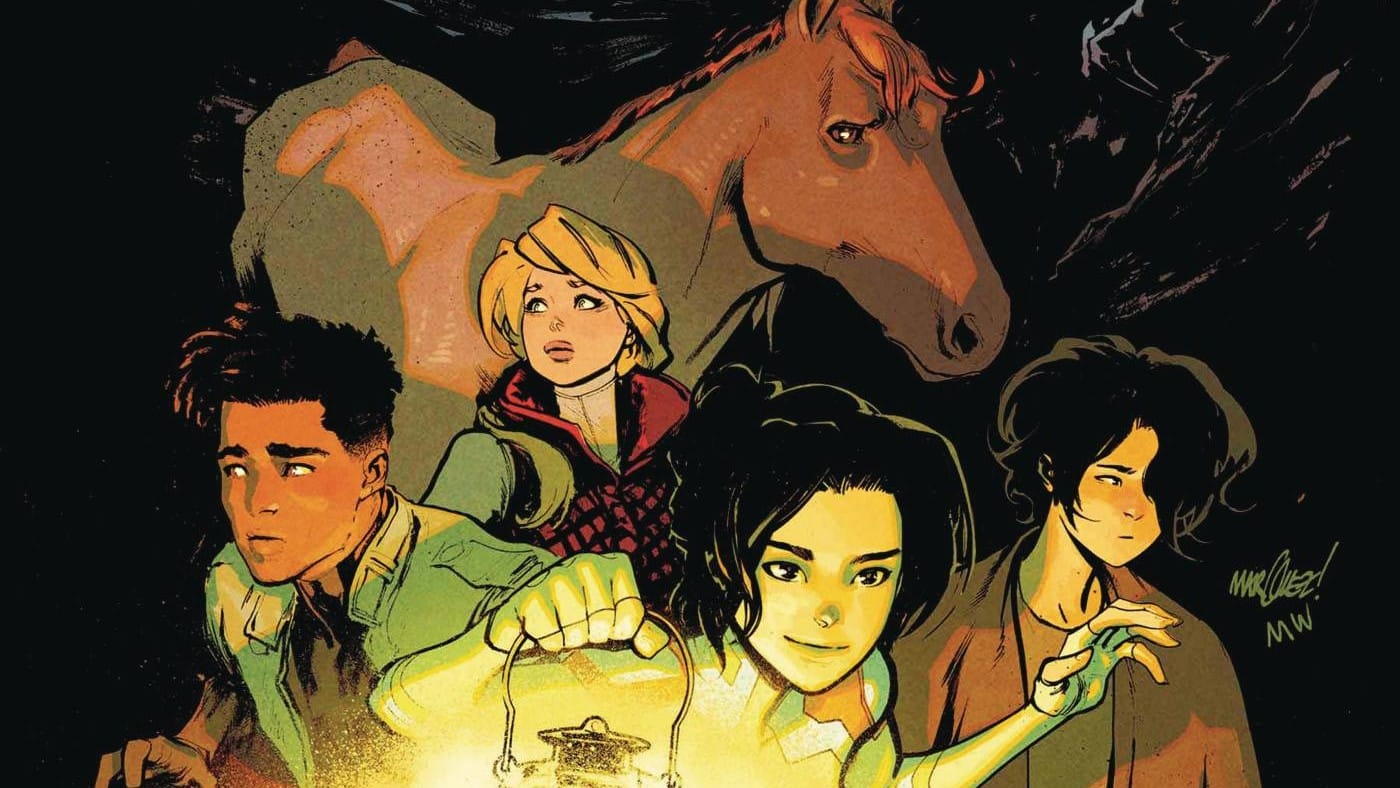The explosive saga ends here, with Rogue and Cyclops on opposite ends of the mutant struggle, perhaps forever! Are they honoring Xavier’s legacy or destroying it? Do they choose loyalty or the law? An all-out action issue that will affect both teams (and the entire mutant community) with devastating results. Uncanny X-Men #8 is written by Gail Simone, drawn by Javier Garron, colored by Matthew Wilson and lettered by Clayton Cowles.
Jake Murray: Hey, everyone, and welcome to another exciting edition of Jake and Dr. Anna ToX… Uncanny X-Men. Today marks the eighth episode of this series, which means … that’s right … we’re discussing issue #8 of Uncanny X-Men.
How’s my podcast intro, Anna? I know it’s a crowded market, but do you think I have a future in this mutant podcasting game?
Anna Peppard: Great, except you buried the lead! This ain’t just Uncanny X-Men #8. It’s also the senses-shattering (I guess!) conclusion of “Raid on Graymalkin,” hailed as a standalone event by the powers that be and by Rogue’s insistence that despite having a past romance with Magneto that is concurrently being revisited in another X-Men comic book, she never, ever liked that dastardly villain.
Brain boys wrasslin’ it out

Jake: OK, plot summary time. The issue opens with a monologue from Dr. Corina Ellis’ lackey and former lover, the mutant Scurvy, formerly known as Phillip. It’s revealed via flashback that, having met her as a pro-mutant guest on her podcast, Ellis exploited Phillip’s mutant gifts to such an extent that he lost his humanity entirely. Think Gollum/Sméagol but replace the ring for sex stuff.
In the present, Scurvy is wrecking the two reunited X-Men teams before being confronted telepathically by Charles Xavier. Scurvy reveals to the Prof that he, along with the late Harvey X, are members of a group called the Avians and that Charles is one of them. And what’s the significance of this? Because, as well as male pattern baldness, the one thing they have in common is that they all have a brain tumor.
Realising that Xavier vs. Scurvy is where the real action is, everyone just … stops fighting. After Charles defeats his fellow Avian with a big telepathic whack, and Ellis and the X-Men agree to down tools in a rare win for Health and Safety risk assessments, the principal matter that remains to be resolved is what to do with Professor X. Ultimately, he decides he needs to re-atone for his sins against mutantkind and continue his incarceration with the organization actively capturing and torturing his people.
Anna, let’s start with broad strokes. What did you make of the plot?
Anna: My immediate reaction to this issue was that I enjoyed it more than previous installments of this event, inasmuch as we actually got a bit of plot progression and a teensy bit of character development from our principal villains. But like a lot of this book’s big reveals, it also left me wanting and occasionally confused.
While I’m all for holding back dramatic details until they can be suitably dramatically revealed, in this book, Simone has had a tendency to introduce a lot of mysteries that we have virtually no ability to puzzle through or solve because, like Phillip/Scurvy until this issue, they’ve been complete black box unknowns. Then, we get info dumps about their backstories which feel a bit belated and emotionally blunt, like we’re being told the plot instead of experiencing it organically. Or, we’re being told why we should care instead of being properly convinced to care.
The fight at the center of this event remains the best case in point. I don’t want to belabor it, because I know we griped about it last time, but there still isn’t a convincing reason why Rogue and Cyclops are fighting, and the line of dialogue I clowned on in our intro really hammers that home. At one point, Rogue thrusts a “Professor Xavier is a Jerk”-style finger in Scott Summers’ face and tells him he’ll never be Professor X, and that she’s a better person than him because at least she doesn’t consort with the likes of Magneto. Putting aside, for the moment, that Rogue’s beloved Professor X regularly similarly consorts with Magneto, including letting Mags help co-found the mutant utopia we were all just living in a year ago, the idea that Rogue, herself a reformed villain whose moms are unreformed villains, would take special umbrage with Scott working with Magneto is ludicrous.
It’s even more ludicrous because Rogue: The Savage Land is currently revisiting Rogue’s onetime romantic fling with Mags, possibly inspired by X-Men ’97 recently reviving that relationship. In more recent continuity, Rogue and Magneto were romantically involved in an X-Men: Legacy storyline. Their personal and romantic connections are so extensive, Marvel.com actually has an official explainer on the subject. While Simone is under no obligation to be in direct conversation with those stories, the existence of those stories, some of which are definitely canonical, can’t help but color how I read the supposed conflict between Rogue and Scott. Which is to say — I read it as utterly baffling.
I also can’t help adding another #CyclopsWasRight. This is specifically in response to Scott saying he doesn’t want to be Professor X. Scott is not only morally correct here (Professor X is, as Rogue’s own callback pose reminds us, a jerk), but also correct in terms of the ongoing story. While the From the Ashes Infinity Comic reveals that Professor Xavier only pretended to kill all those human guys on that ship during the Fall of Krakoa, I don’t think any of the X-Men know that? As in, I’m pretty sure they still think Charles is a mass murderer? Granted, so is Magneto. But falling back on an Xavier-vs.-Magneto dichotomy, and then trying to somehow map Rogue and Cyclops onto that dichotomy, definitely doesn’t make sense unless you ignore the last, I dunno, 20 years of comics? Plus another 20 years of comics before the ’90s reboot that re-vilified Magneto. Sure, no one needs to be a slave to continuity. But character motivations in continuity comics should make some small modicum of sense — especially when a whole mini-event and future franchise status quo depends on it.
As Scott Summers, who somehow continues to be right, so eloquently puts it in the closing pages of this issue: “Sometimes, both options stink.”
Jake: I’m also at the risk of belaboring here, but as you say, Magneto hasn’t been a villain consistently for many decades at this point, he just seems like one. What I mean by that is that he’s a villain in a postmodern, “meaning is a social construction that is influenced by culture and is not neutral or objective” kind of way. And what I mean by THAT is that he was a villain in the ’90s cartoon and the recent series. I’ve used the term “back to basics” advisedly throughout my review of the From the Ashes era, but I feel the need to evoke it here.
Anyway, I found it so strange that Xavier and Scurvy’s fight ended up being so central to the plot, and the execution really didn’t help matters. Firstly, Xavier was only reintroduced at the end of X-Men #9, and until after the fight had finished we had no insight into his motivation or what he’d been doing since the Fall of Krakoa. All we really learned ahead of the fight was how down-bad for Ellis Scurvy was. I just couldn’t engage with or invest in the scene at all, and the end result was a bit of a damp squib.
The other factor is the way Javier Garron drew the scenes. I thought his work on this issue generally was very good, but the telepathic fight scenes always felt like an afterthought. There are occasions where the scenes are literally off to the side of the main action, but even when they’re given page space, the two figures are drawn at such scale that they take up the entire panel. This leaves everything feeling a bit static. The inks and colors don’t help either. The combination of light outlines and washed-out neon greens and blues just makes the scene fade into the background. The fact that the fight’s deciding blow is drawn in a narrow panel on the top right of the screen, and needs a further panel of Psylocke confirming that the fight has, in fact, finished, says it all.
Anna: Other kind words for Garron: The big, pop-tastic title page splash was unquestionably my favorite part of the issue.
Jake: Same! Absolutely incredible. Garron did some good work here. His layouts for the first nine or so pages in particular were so varied and expressive, using the height, width and shape of each panel to make sense of the chaos of the fight scene, while interspersing them with flashback issues and Scurvy and Xavier’s tête-à-tête.
Speaking of Charles Xavier, if atonement were an Olympic sport…
His role in the From the Ashes era has been bizarre. For a character who’s supposedly been written out of the line, we haven’t half heard a lot from him. The irony is that the plotlines he has been involved in are the exact sort of reasons he was written out in the first place. How many more original sins can a character have? How many first loves? He’s existed in a state of penitence ever since the Hellfire Gala, and I know I’m repeating myself here, but the character was entirely broken by the end of Fall of X. I find myself regularly thinking about the scene in Rise of the Powers of X #3 where he attempts to kill Moira as a child to prevent the tragedy of Krakoa. Witnessing the utter desperation and degradation of mutantkind’s symbol of hope and morality was heartbreaking. R.B. Silva drew it beautifully, and Kieron Gillen wrote it beautifully:
“Xavier, the curator of the dream, is dead. We killed him together, you and I. The dream must go on without me.”
Cut to the end of X-Men #9, as a smug-looking Xavier emerges from captivity for another round of self-flagellation. Are we really bringing him back for the same old Charles Xavier holier-than-thou routine? After the SS Agnew retcon you’ve alluded to already, do we really need another apology tour?
I know, Scurvy. Thy honesty and love doth mince this matter. Now go beat up those muties.

Jake: When I look back on this series in a year or two, I don’t think it’ll be Rogue, or Gambit, or Wolverine at the forefront of my mind. Given they’ve had so little to do so far, it probably won’t be the Outliers, either. It’ll be Sarah Gaunt (cherish the memories), and it’ll be Dr. Ellis. I find both of them completely absurd, and I guess somewhat fascinating, too. We spoke last time about Ellis’ descent from an Iago-esque Shakespearean figure to cartoonish villainy. What the last couple of “Raid on Graymalkin” issues have really hammered home for me is that she’s still kind of both, which is fundamentally what makes her not work.
The refrains of anti-mutant bigotry like “trash,” “mutie” and “mutant fool” are so played out in X-Men comics at this point that, when you combine it with the flamboyance of her entrance into the fight scene wearing a white cape, thigh-high boots and holding a massive gun, it’s more campy than sinister. She reminds me of Selene or even Deathbird in that way. The problem is, she’s sometimes incredibly vitriolic in a grandiose, unpleasant way that makes her more believable and formidable. Scenes like the one with Blob where she forces him to refer to himself as “born unworthy…prone to evil…. shame of our race…” (you get the gist) are on an entirely different level of both villainy and writing quality. It honestly confounds me.
Another issue I have with Ellis’ characterization in this issue is that rather than use her dialogue to develop her motivations, Simone repeats the same line about her brother’s death being mutants’ fault. In my opinion, she needs to be humanized further to achieve the level of complexity needed to be an interesting character.
The final issue I’m afraid we must settle is podcast-gate. On behalf of mutant podcasters everywhere, Anna, how can you justify a) the existence of the Dr. Corina podcast and b) her actions?
Anna: Hey, my mutant podcast only ever talked anyone into respecting Nightcrawler’s sexiness. If that stole anyone’s lifeforce, I sincerely apologize, but I like to think the podcast arm of my role as Mr. Wagner’s (unofficial) PR manager merely made the world a better (sexier) place.
Continuing my bit of being baffled by character motivations, I’m still baffled by Ellis. She is a deeply unpleasant character, a bigoted podcast host turned genocidal abusive mutant jailer/conversion camp impresario who also, in this issue, proves she’s willing to mass murder her fellow humans if it might make some mutants sad. Yet she’s also, as you note, masquerading, visually, as a campy ’60s Bond girl. The X-Men franchise has had so many bigoted big bads, including, during the Krakoa era, at least two bigoted big bad women who were also genocidal mutant jailers who were also motivated by mutants harming their loved ones. At present, other than her discordant visualization, I’m at a loss as to why Ellis is meant to be interesting or unique. Supposedly, her “message” and sexy charisma are the main sources of her tremendous institutional and personal power. But for me, some cute miniskirts and thigh-high boots aren’t enough to sell those supposed charms.
Reflections on ‘Raid’

Jake: Let’s briefly cover our thoughts on this event overall. What are your overriding thoughts and feelings about “Raid on Graymalkin” now that it’s all said and done?
Anna: I feel badly about how negative I’ve been in this review, and feel worse ending on another negative note, especially because I think this may be my last time talking about this book. Overall, despite some scattered winning moments and some very pretty art, I can’t say I’ve enjoyed this series. Which puts me out of step with lots of other folks who seem to dig it. And that’s fine; there’s been an emphasis, in the letter pages, on appealing to new readers, and I’m not that, so maybe this one just isn’t for me. Regardless, “Raid on Graymalkin” has been bringing all the issues I’ve had with this series to the fore, in particular, those aforementioned messy character motivations among both the heroic set and our villains.
Jake: My personal view on it is quite simple: This isn’t an event. It’s just a drawn out superhero fight. In its defense, I don’t think it was particularly marketed as a big deal. My issue is that it’s indicative of the era overall. Compare “Raid on Graymalkin” to the first events of other eras — “X of Swords,” “Battle of the Atom,” “X-Cutioner’s Song” — they may not have been perfect, but at least they had a modicum of ambition to them. This is just business-as-usual superhero comics.
Anna: And again, that’s clearly what some folks want; this book is selling well, so the audience is there. But I’m rarely in the mood for business-as-usual superhero comics, especially X-Men comics, especially now. Which is why it’s time for me to put this book down and look elsewhere for those senses-shattering thrills. I hear Brand Echh has a few Absolute-ly fabulous things brewing.
Jake: I’m honestly glad people are enjoying this book. I guess it’s just not for me, so it’s probably a good thing that this will be the last issue we review. I will say though, as much as this comic has confounded, frustrated and outright bamboozled me at times, I’ve certainly enjoyed discussing it with you, Anna.
Anna: The real “Raid on Graymalkin” is the friends we’ve made along the way.
X-traneous thoughts
- So the cover sure makes it seem like Inmate X is Mister Sinister, but what if it’s … gasp … Nate Grey? “X-Manhunt” indeed! (Note: this wild speculation is based on nothing besides bitter longing for the fun type of weird revelation and an affection for clever branding.)
- And here was me hoping the Avians had something to do with the Shi’ar.
- I thought Jitter’s hero crush on Magik was very sweet, and I like the way Simone wrote Magik’s dialogue overall.
- Love Javier Garron’s short king Logan, and his dedication to showing just how tight those supersuits really are when drawing characters from behind.
- There truly were some spectacular butts in this issue, including Juggernaut’s gorgeously globular glutes, which really take the cake in that panel smashing Rogue.
Buy Uncanny X-Men #8 here. (Disclaimer: As an Amazon Associate, ComicsXF may earn from qualifying purchases.)

